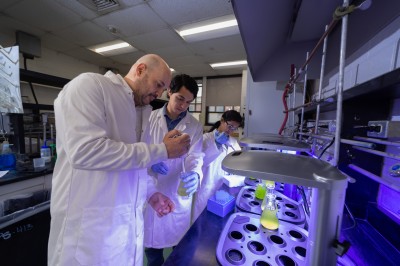Science
UTEP Researchers Enhance Microalgae Biofuel Production with Nanotech

Researchers at The University of Texas at El Paso (UTEP) have made significant advancements in biofuel production by employing nanotechnology to boost yields from microalgae. Their findings, published in the journal ACS Applied Bio Materials, highlight the potential of the microalga Chlorella vulgaris, a species known for its rapid growth in freshwater environments.
This innovative research indicates that the integration of nanotechnology can enhance the efficiency of biofuel extraction processes. The study reveals that utilizing nanoscale materials can improve the growth rate and biomass production of Chlorella vulgaris, making it a more viable option for sustainable energy sources.
The research team, led by UTEP scientists, focused on optimizing the growth conditions of microalgae using nanomaterials. These materials help create an environment that fosters higher productivity, which is essential for biofuel applications. By manipulating the microalgal cell structures at the nanoscale, the researchers found that they could significantly increase the yield of biofuel produced from these organisms.
Implications for Sustainable Energy
The implications of this research are profound, particularly in the context of global energy needs. As nations seek to reduce their reliance on fossil fuels, biofuels derived from microalgae present an attractive alternative. The ability to enhance production through nanotechnology could accelerate the transition to renewable energy sources.
The study underscores the importance of continued research in this area. With global energy consumption projected to rise, finding efficient and sustainable fuel alternatives is critical. Microalgae, with their high growth rates and ability to absorb carbon dioxide, may offer a solution to some of the pressing challenges facing energy producers today.
Additionally, the findings from UTEP may inspire further innovations in the field of biofuels, encouraging other researchers to explore the intersections of nanotechnology and renewable energy.
Future Research Directions
Looking ahead, the UTEP research team plans to explore additional species of microalgae and different nanomaterials to further enhance biofuel production. By broadening their research scope, they aim to identify the most effective combinations for maximizing yields.
This study represents a step forward in the quest for sustainable energy solutions. As the world grapples with climate change and the need for cleaner energy sources, advancements like these could play a crucial role in shaping the future of biofuels.
The research at UTEP not only contributes to academic knowledge but also has practical implications for industries looking to implement more sustainable practices. By leveraging nanotechnology, the potential for increased biofuel production could lead to more environmentally friendly energy solutions that benefit both industry and society.
-

 Technology5 months ago
Technology5 months agoDiscover the Top 10 Calorie Counting Apps of 2025
-

 Technology3 weeks ago
Technology3 weeks agoOpenAI to Implement Age Verification for ChatGPT by December 2025
-

 Health3 months ago
Health3 months agoBella Hadid Shares Health Update After Treatment for Lyme Disease
-

 Health3 months ago
Health3 months agoAnalysts Project Stronger Growth for Apple’s iPhone 17 Lineup
-

 Health4 months ago
Health4 months agoErin Bates Shares Recovery Update Following Sepsis Complications
-

 Technology5 months ago
Technology5 months agoDiscover How to Reverse Image Search Using ChatGPT Effortlessly
-

 Technology3 months ago
Technology3 months agoElectric Moto Influencer Surronster Arrested in Tijuana
-

 Technology5 months ago
Technology5 months agoMeta Initiates $60B AI Data Center Expansion, Starting in Ohio
-

 Technology2 months ago
Technology2 months agoDiscover 2025’s Top GPUs for Exceptional 4K Gaming Performance
-

 Technology5 months ago
Technology5 months agoRecovering a Suspended TikTok Account: A Step-by-Step Guide
-

 Health5 months ago
Health5 months agoTested: Rab Firewall Mountain Jacket Survives Harsh Conditions
-

 Lifestyle5 months ago
Lifestyle5 months agoBelton Family Reunites After Daughter Survives Hill Country Floods













